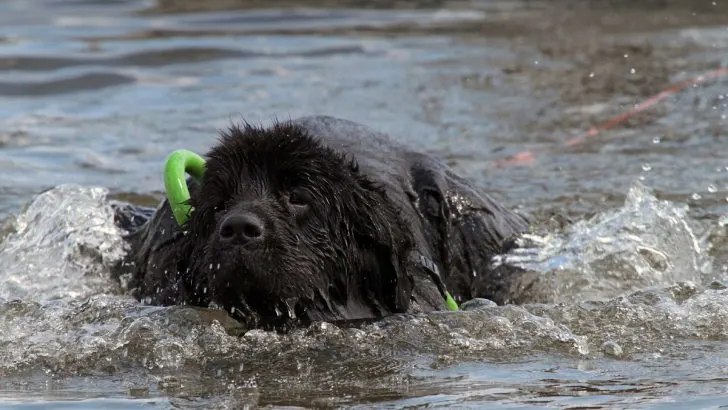Newfoundlands are truly gentle giants, known for their big hearts and even bigger size!
As one of the largest and strongest working dog breeds, these furry friends need a lot of love, care, and a lot of space to thrive.
This Newfoundland growth chart will help you understand their growth and weight, ideal diet, and what to expect as your Newfoundland puppy grows up.
Newfoundland Growth & Weight Overview
To give you a better idea of how your puppy will grow, here’s a simple Newfoundland growth chart showing the average weight and height for both male and female Newfoundlands.
Keep in mind that the following chart is just a rough estimate and that each Newfie pup grows at their own pace!
| Age (Months) | Male Weight (lbs) | Male Height (inches) | Female Weight (lbs) | Female Height (inches) |
| 3 | 35-45 | 16-18 | 30-40 | 16-18 |
| 6 | 80-90 | 22-24 | 65-80 | 22-24 |
| 9 | 110-120 | 26-28 | 95-105 | 26-28 |
| 12 | 130-150 | 29-31 | 110-130 | 29-31 |
| 18 | 140-160 | 30-32 | 120-140 | 30-32 |
| 24 | 150-170 | 31-33 | 130-150 | 31-33 |
Looking at the above numbers, we can observe several key trends in the development of Newfoundland puppies.
This Newfoundland growth chart is created based on the official American Kennel Club standards for purebred dogs.
Keep in mind that these numbers can change if you have one of Newfoundland cross breeds.
For a more accurate estimate of your Newfoundland dog size, you can use online puppy growth calculators where you can fill in specific information about your dog.
Newfoundland Puppy Growth Chart
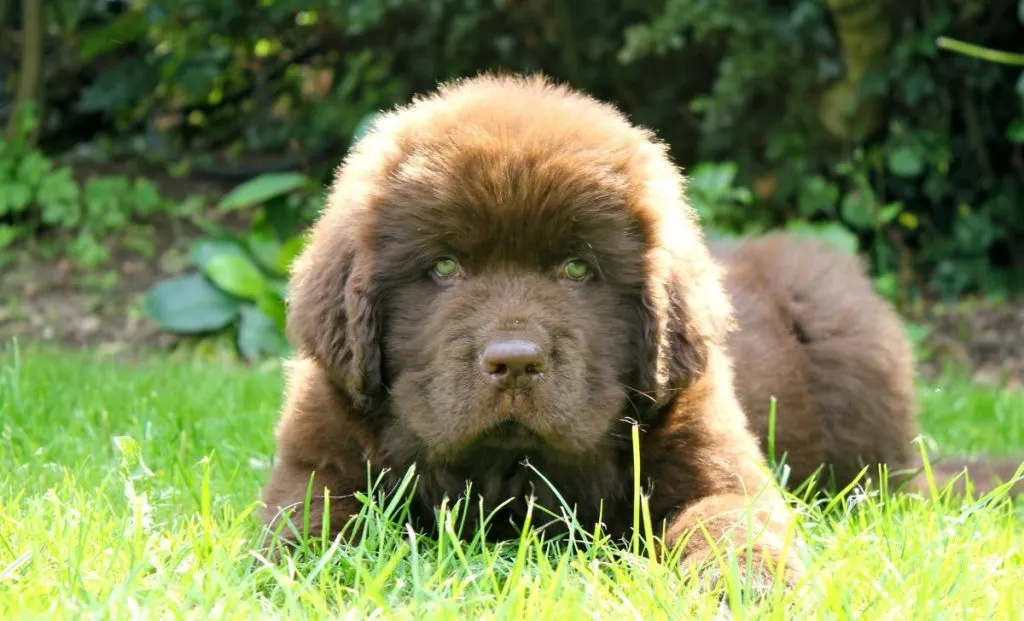
Newfoundlands are among the most adored massive dog breeds because of their enormous stature and kind disposition. They look like large teddy bears who are waiting for some extra cuddles!
Now, they are adorable as adults. But, wait until you see Newfie pups! These adorable furballs are full of personality and growth spurts!
A Newfie pup’s growth is an amazing adventure full of quick changes and significant occasions.
If you are wondering ”How much do Newfoundland puppies weigh?” you’re at the right place!
I’m here to break down your gentle giant’s growth into important development periods so you can prepare for what to expect as they get older.
Birth To 8 Weeks
Weighing just a few pounds at birth, these little round pups grow rapidly during this period.
They spend most of their time sleeping and dreaming about pup knows what! They are also nursing, which is very important for their development.
As newborns, they are blind and deaf, but within the first two weeks, they start to open their eyes and ears, slowly becoming aware of their surroundings.
This is also the time when they begin to make their first wobbly attempts at walking.
Through play and interaction, they learn essential behaviors and social cues that will shape their future interactions.
This period is critical for developing the Newfoundland dogs nature which is simply pawesome. Psst, keep reading to find out more.
8 To 16 Weeks
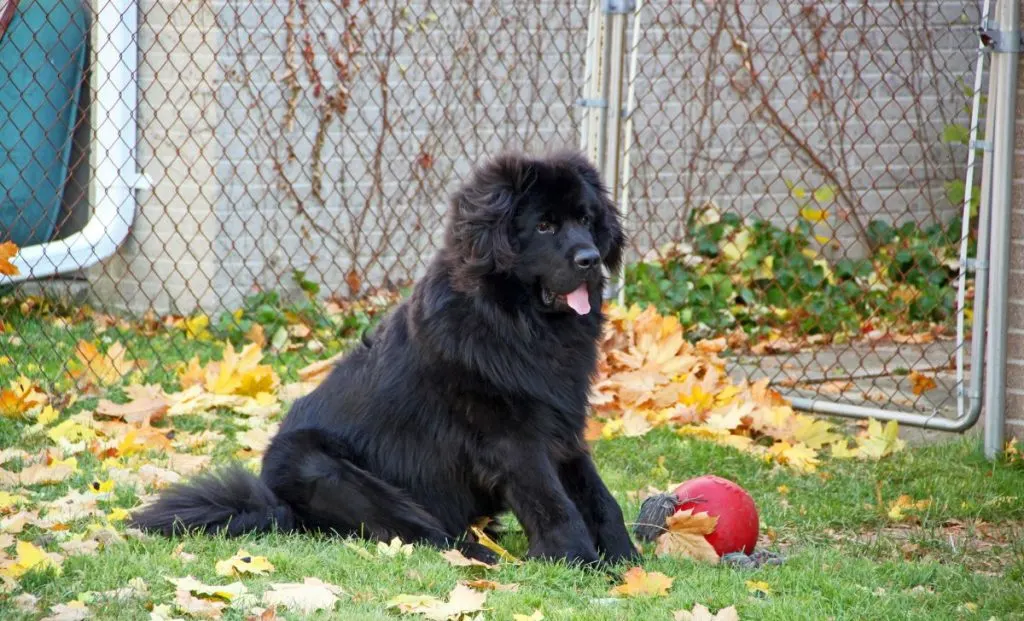
By the time Newfoundland puppies are around 8 weeks old, their coat colors become more noticeable.
These little round bundles of fur are ready to explore the big world around them. They are incredibly curious and start to show their playful personalities.
This period is also known as early socialization and is crucial for their development.
During these weeks, your Newfoundland puppy will weigh between 20-40 pounds, depending on their specific growth rate.
They are growing fast, so it’s important to feed them an ideal diet rich in high-quality proteins, healthy fats, vitamins, and minerals.
This will support their development and help them grow into their large size and giant hearts!
Newfoundland puppies at this stage are like little explorers. They are fascinated by new sights, sounds, and smells.
It’s a good idea to introduce them to a variety of environments, from the safety of your home to the sights and sounds of a park.
Remember, everything is new and exciting for them, so patience and gentle encouragement go a long way.
4 To 6 Months
During these months, Newfoundland puppies experience one of their biggest growth spurts. These adorable little furballs can weigh anywhere from 60 to 90 pounds.
This rapid growth means their bones and muscles are developing quickly, so providing the right nutrition is still essential.
These big dogs are not just growing in size but also building the strength they need for their powerful working dog nature.
As your Newfie pup grows, expect a higher rate of energy levels. So, they will need various activities and healthy exercise.
Regular play sessions with tennis balls, tug of war, and other different toys and activities help them develop strong muscles and coordination.
However, since their joints are still developing, it’s crucial to keep your Newfie pups away from high-impact activities.
Gentle play on level ground is the best way to keep them away from dangerous places.
6 To 12 Months
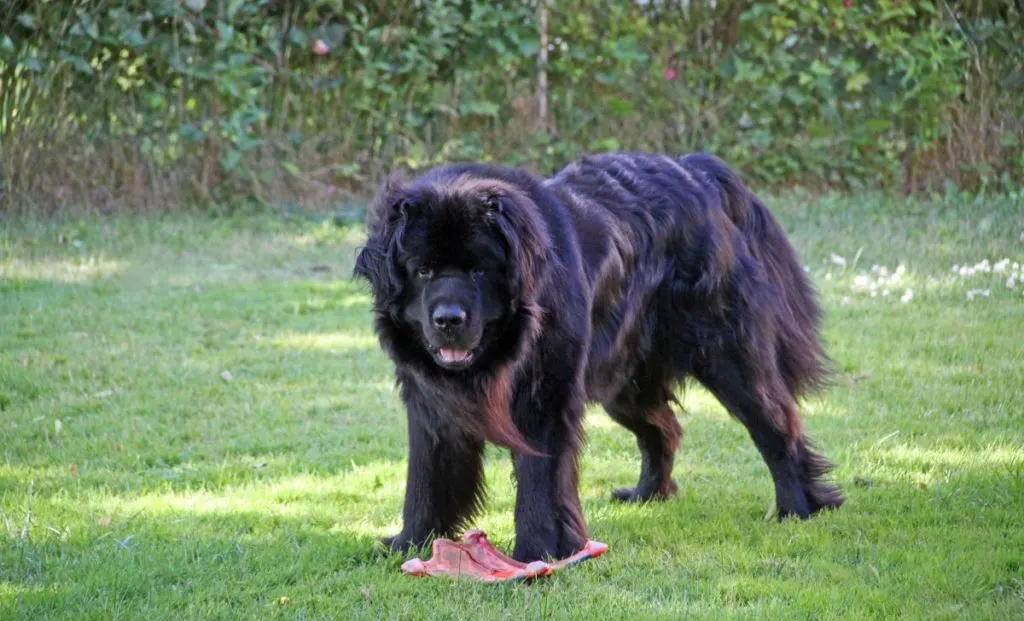
Between 6 to 12 months, your Newfoundland puppy enters the adolescent phase, a time marked by continued growth and significant behavioral changes. And yes, they may be nearing their true giant size, but they are still not at their full size.
In the first six months, both female and male Newfoundlands experience significant weight and height increases.
They are gaining both height and weight, and developing their adult features.
Because they are so smart and eager to learn at this age, Newfoundlands respond well to techniques that involve positive reinforcement.
Training becomes even more important now as your 6 month old Newfoundland pup starts to test boundaries and assert their independence.
Many Newfie parents now find it helpful to incorporate advanced commands and obedience training in their pup’s schedule.
Keep an eye on their weight and height, as Newfoundlands are prone to joint issues like hip dysplasia, especially given their rapid growth and large size.
Therefore, one of the greatest ways to promote your Newfies’s general health and continuing development can be discussed with your veterinarian.
12 To 18 Months
Newfoundland weights & heights during their first year can vary significantly.
By 18 months, male newfoundlands typically weigh between 130 to 150 pounds and stand around 28 to 30 inches tall, while females weigh between 100 to 120 pounds and stand around 26 to 28 inches.
As you may have guessed, these giant dogs require a lot of space to move and play, due to their massive size. This makes them different from smaller canines.
Newfie parents must make sure to give them a lot of space to keep them from becoming bored and prevent destructive activities, all while also enabling them to exercise and stretch their strong muscles.
Behaviorally, you might notice that your Newfoundland is maturing and becoming more settled.
They are likely to be less mischievous compared to their younger months, but it’s still important to monitor their behavior and provide plenty of mental stimulation.
Engaging in activities that suit their powerful working dog nature, like swimming or gentle hiking, can be beneficial. Avoid high-impact activities that could strain their joints
It’s important to remember that their massive size also means they can accidentally knock over small children or fragile objects.
They may be a little bit clumsy, so setting up a safe, puppy-proof area in your home is a good idea.
18 To 24 Months
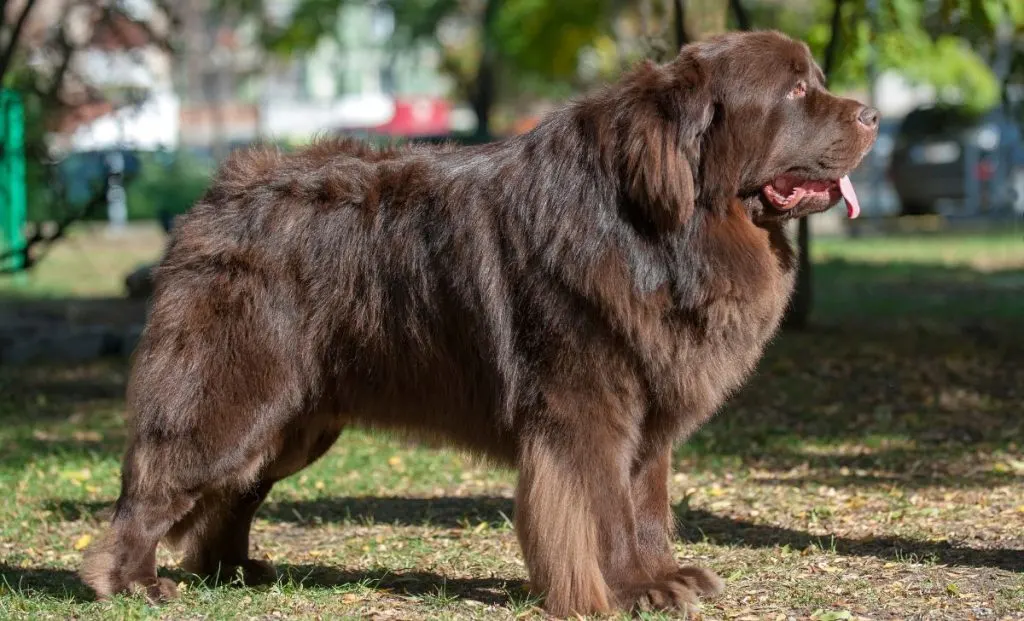
Between 18 to 24 months, your Newfoundland puppy will transition into full adulthood. This is a significant milestone as they reach their full adult size and weight.
So, how much do Newfoundlands weigh now? Well, adult male Newfoundlands typically weigh between 150 to 170 pounds, while females weigh between 130 to 150 pounds. Pretty massive, right?
They stand tall and strong, reflecting their heritage as powerful working dogs.
At this life stage, the focus should be on maintaining their health and happiness.
With proper care and upbringing, your Newfoundland will not only be physically impressive but also a well-adjusted, happy member of your family.
Your adult Newfoundland will require regular exercise to keep their muscles strong and their mind stimulated.
A pro tip – make sure to continue their weight and overall health to help prevent or catch any potential issues early.
Factors That Influence Newfoundland Growth Chart
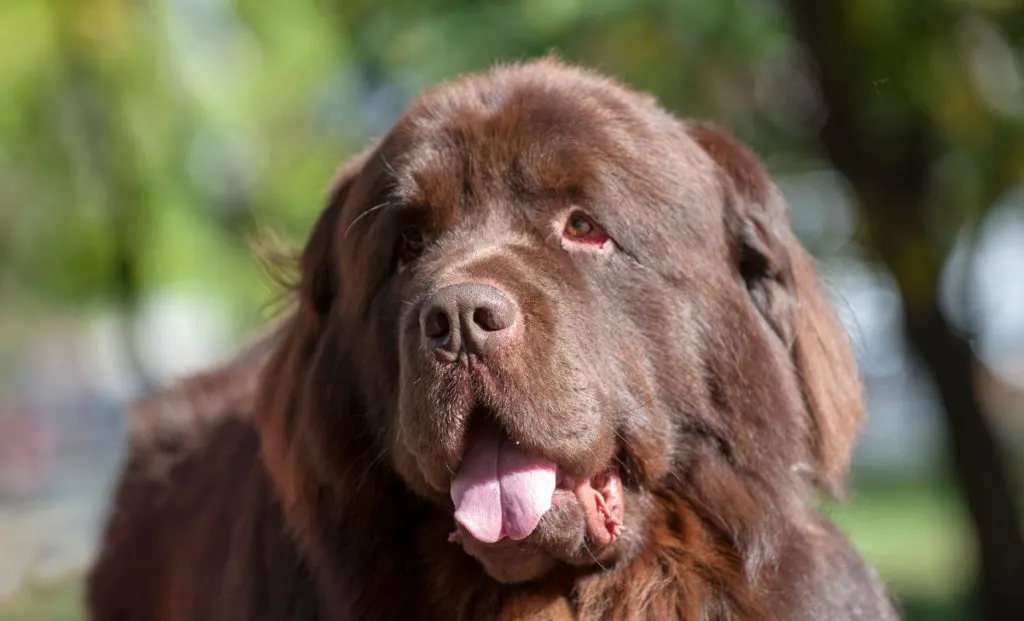
These gentle giants grow from little round pups into big, friendly dogs.
Here are some important factors that can either help or hinder their growth.
Make sure to read them all to understand what influences the growth of your Newfie pup!
Genetics
Genetics is like a puppy’s blueprint. The size and growth rate of your Newfoundland puppy come from their parents’ genes.
So, if their parents are big, the puppies will likely be big too!
Knowing about their family background helps you understand how large your Newfie pup might get.
You can always check the American Kennel Club official breed standards for Newfoundlands to check how this dog should look like.
Diet
A balanced and nutritious diet is super important for your Newfie pup’s growth. Think of it like fuel for their bodies.
High-quality food with lots of protein, healthy fats, vitamins, and minerals helps them build strong bones and muscles.
Some Newfie parents even put their dogs on BARF diets (raw food). However, we have to be careful when feeding Newfies raw meat.
These diets pose significant risks of microbial contamination with pathogens such as Salmonella, Campylobacter, and Yersinia, which can affect both pets and their owners (1)
It’s always a good idea to talk to your veterinarian about the best food for your puppy. This will help them grow into their giant size in a healthy way.
Exercise
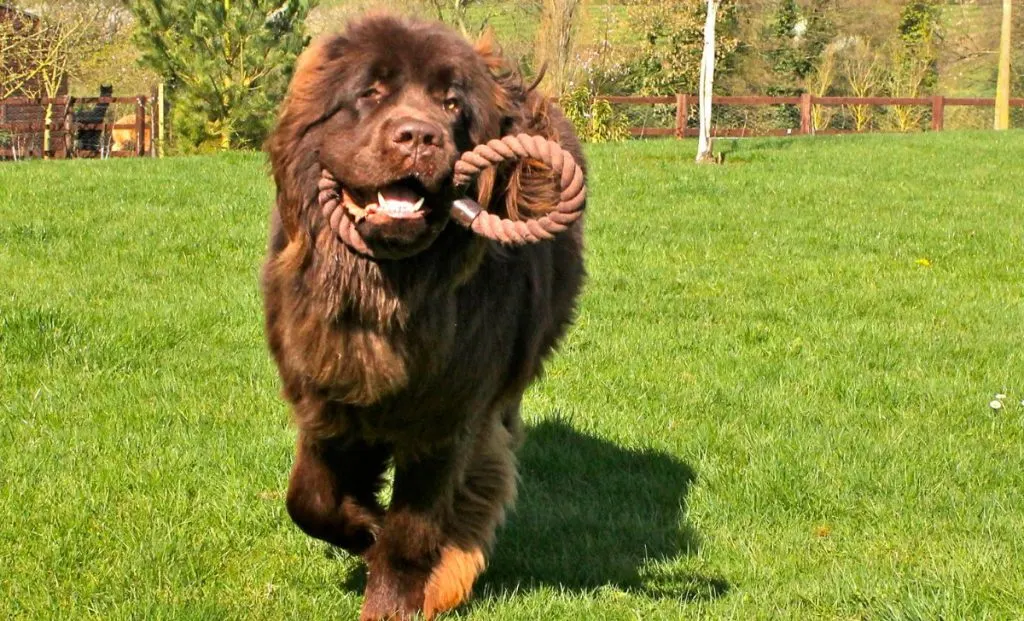
Newfie pups need regular exercise to build strong muscles and stay healthy. Playing and running around are fun ways for them to get the exercise they need.
However, it’s important to avoid rough activities that might hurt their growing bodies.
Health Care
Regular check-ups with the veterinarian are crucial for your puppy’s growth.
These check-ups help catch any health issues early, like hip dysplasia, which is common in giant breeds like Newfoundlands (2).
Vaccinations and parasite control are also important parts of their health care.
Environment
The environment where your Newfie pup grows up is very important. They need lots of space to move and play because of their massive size.
A safe yard or regular trips to the park are great ways to give them the space they need. A fun and stimulating environment with toys and social interactions helps keep their minds sharp too.
Newfoundland puppies are amazing companions, and with the right care, they will grow into happy, healthy adult dogs.
So, keep an eye out on the Newfoundland growth chart and enjoy every moment with your gentle giant as they grow and explore the world around them!
References
1. Fredriksson-Ahomaa, M., Heikkilä, T., Pernu, N., Kovanen, S., Hielm-Björkman, A., & Kivistö, R. (2017). Raw Meat-Based Diets in Dogs and Cats. Veterinary Sciences, 4. https://doi.org/10.3390/vetsci4030033.
2. Wood, J., Lakhani, K., & Dennis, R. (2000). Heritability and epidemiology of canine hip-dysplasia score in flat-coated retrievers and Newfoundlands in the United Kingdom.. Preventive veterinary medicine, 46 2, 75-86 . https://doi.org/10.1016/S0167-5877(00)00140-9.

Meet Iram, a devoted veterinarian, passionate dog lover, and current Ph.D. candidate at Utrecht University in the Netherlands. Seamlessly blending her roles as a vet and content writer, Iram channels her love for dogs into heartfelt narratives.
Since childhood, Iram nurtured a dream of becoming a vet, a passion that runs deep in her family. Having now fulfilled that dream, she’s eager to share her acquired knowledge. In her writing, Iram not only explores the emotional bond between humans and their canine friends but also integrates her veterinary expertise, offering readers a holistic understanding of their beloved pets.
